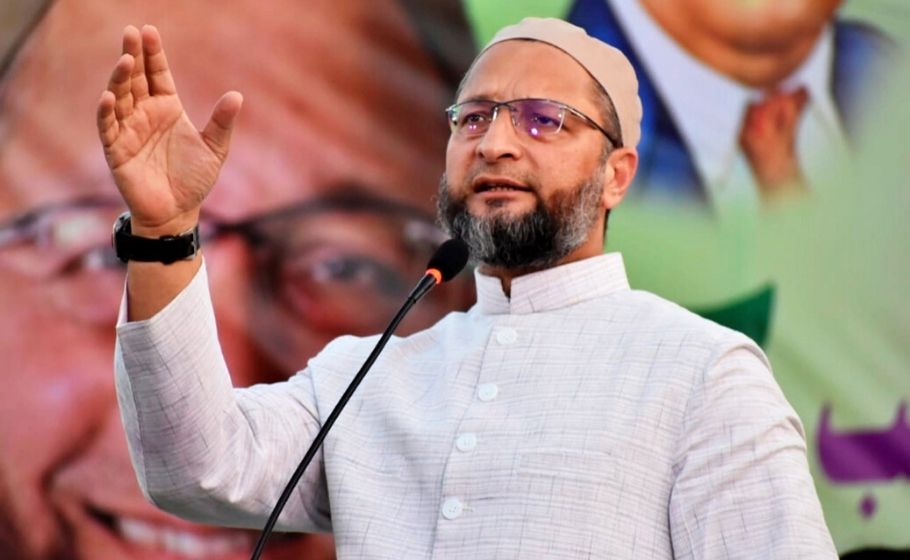
What Asaduddin Owaisi’s foray means for Bengal’s polls
The AIMIM last week fielded six candidates, scaling down its initial plan to contest at least 70 minority-dominated constituencies

Hyderabad MP Asaduddin Owaisi’s All India Majlis-e-Ittehadul Muslimeen (AIMIM) is the latest to enter the Bengal electoral fray to stake claim on the state’s crucial minority votes.
The AIMIM last week fielded six candidates, scaling down its initial plan to contest at least 70 minority-dominated constituencies.
The change of plan was necessitated after Abbas Siddiqui of Furfura Sharif, whom the party wanted to piggyback on, dumped it in favour of the Left Front and the Congress.
The Left parties and the Congress joined hands with the Furfura cleric hoping to increase their share of minority votes, now heavily tilted towards Mamata Banerjee’s Trinamool Congress.
With the BJP trying to corner the majority of the Hindu votes with its polarisation tactics, support of the state’s nearly 30 per cent minority votes is crucial for the TMC to retain power.
Before the TMC’s rise in 2011, Muslim voters were largely with the Left Front, barring a few pockets in Murshidabad, Malda and North Dinajpur districts.
The Left’s minority vote-base has completely moved towards the TMC since 2011, but the Congress somehow managed to retain some footprint among a few minority-dominated areas in Murshidabad and Malda.
The AIMIM is contesting three seats in Murshidabad, one seat each in Malda, North Dinajpur and West Burdwan districts, according to M Hoque, a senior leader of the party’s state unit.
Incidentally, in these minority areas Siddiqui’s Furfura Sharif does not have much influence and hence his newly floated Indian Secular Front (ISF) was forced to play a second fiddle to the Congress here.
In the 2019 Lok Sabha election, when the BJP cornered around 54 per cent Hindu votes, the TMC could yet end up with 22 of the state’s 42 parliamentary seats because over 70 per cent minorities voted for it.
The difference between the total votes secured by the TMC and the BJP was less than 3 per cent.
The BJP is trying to have a similar consolidation of Hindu votes in its favour in the assembly election.
In a bid to polarise votes, the party is even trying to communalise killing of four persons from a Muslim community in firing by central forces outside a polling booth at Sitalkuchi in Cooch Behar district on April 10.
On the same day at Sitalkuchi another 18-year-old voter was killed in a separate incident.
Citing the second incident where the victim was a Hindu boy, Home Minister and BJP leader Amit Shah accused Mamata Banerjee of not showing equal empathy for all the five deaths, an allegation vehemently denied by the TMC.
“The TMC is politicising the Sitalkuchi killings. Mamata Banerjee had paid tributes only to four persons who were killed in the CISF firing but did not condole the death of Anand Barman as he does not fit in her vote bank politics,” Shah said.
Also read: Singur, land of missed opportunities, in focus in Phase 4 of Bengal polls
Calling the home minister a “liar”, the TMC spokesperson Derek O’Brien tweeted a photo of a plaque where Banerjee paid tribute to those killed at Sitalkuchi on the ill-fated day.
The picture clearly showed all five names, including that of Barman.
The BJP leaders however continued to make controversial comments about the incident.
“Don’t try to play too much with us or else we will repeat the Sitalkuchi game,” warned BJP state general secretary Sayantan Basu at a road show on Monday ( April 12), trying to allude to the TMC’s poll slogan of ‘khela hobe‘ (the game is on).
Earlier, BJP state president Dilp Ghosh said more Sitalkuchi-like incidents would take place if the “bad boys” did not behave properly in the next phases of polling.
Also read: EC role under scanner as violence mars each phase of Bengal pollhttps://thefederal.com/west-bengal-elections-20201/ec-role-under-scanner-in-bengal-as-violence-continues-despite-8-phase-polling/
The impact of the BJP’s polarisation politics on voters will be known after the votes are counted on May 2. But if the Hindu votes do consolidate in favour of the BJP like it did in last the general election, any marginal swing away of minority votes from the TMC could be disastrous for the party.
In this context, the AIMIM’s late entry into the scene added a new twist to the state’s minority politics.
Minority population in the three Murshidabad seats of Jalangi, Sagardighi and Bharatpur is between 55 and 70 per cent.
In Malda’s Malatipur, another seat the AIMIM is contesting, the concentration of Muslim population is more than 60 per cent.
In two other seats – Itahar in North Dinajpur and Asansol North in West Burdwan – Muslims comprise more than 45 and 20 per cent of the voters, respectively.
In Murshidabad and Malda in particular, Muslim votes are precariously divided between the TMC and the Congress. Hence any further split in the minority votes could be advantageous for the BJP.
Even the AIMIM leaders admit this, but said it was not their doing.
“We had extended our friendship to all non-BJP parties. But they refused to join hands with us. Preventing a split in minority votes is not our responsibility alone,” said Hoque.
The game is on.


